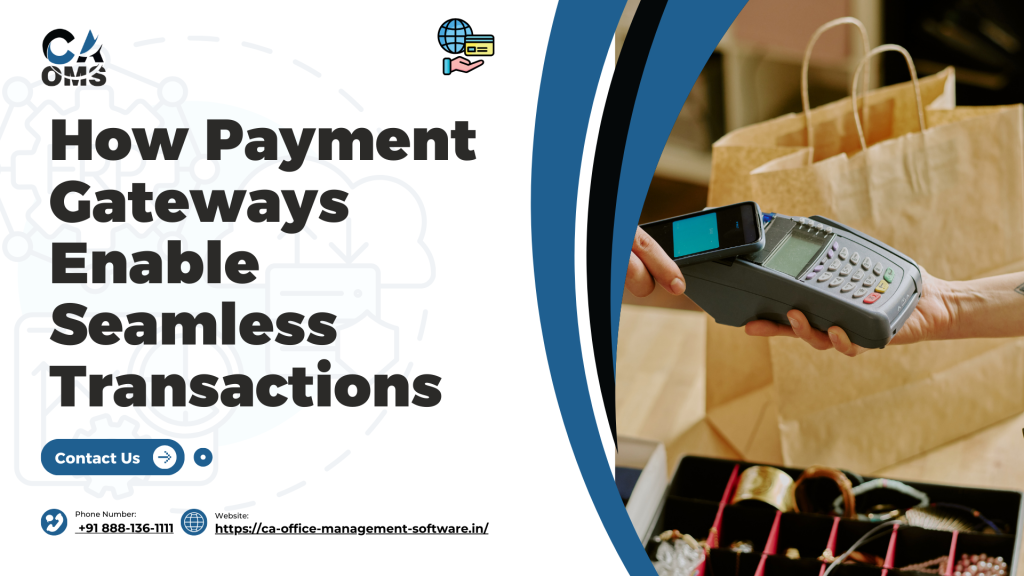Introduction
Payment gateways play a crucial role in modern e-commerce, allowing businesses to process transactions securely and efficiently. They act as intermediaries between merchants and financial institutions, ensuring that customer payments are verified and completed without issues. By leveraging encryption and authentication protocols, payment gateways protect sensitive financial data, reducing fraud risks. In today’s digital world, where online shopping is more popular than ever, payment gateways have become indispensable tools for businesses of all sizes. This article explores how payment gateways enable seamless transactions, their working mechanism, benefits, and the factors businesses should consider when choosing a payment gateway.
What is a Payment Gateway?
A payment gateway is a technology that facilitates online transactions by securely transmitting payment information between the customer, merchant, and financial institution. It acts as a bridge that connects e-commerce websites to payment processors, allowing funds to be transferred securely. Payment gateways support multiple payment methods, including credit cards, debit cards, digital wallets, and bank transfers. They use encryption to protect customer data during transactions, ensuring that sensitive information is not intercepted by malicious actors. Without payment gateways, businesses would struggle to provide customers with secure and seamless online payment experiences, ultimately affecting their revenue and customer satisfaction.
How Payment Gateways Work
Payment gateways operate in multiple stages to process transactions smoothly. First, a customer selects a product and proceeds to the checkout page. Upon entering payment details, the payment gateway encrypts the information and sends it to the acquiring bank for verification. The acquiring bank forwards the request to the customer’s issuing bank, which checks whether the customer has sufficient funds. If approved, the issuing bank sends a confirmation to the payment gateway, which then notifies the merchant. This entire process happens within seconds, allowing for fast and efficient transactions. Payment gateways also integrate fraud detection mechanisms, ensuring that transactions are secure and legitimate.
Key Features of Payment Gateways
Payment gateways come with various features that enhance transaction security and efficiency. One of the primary features is encryption, which ensures that payment data is transmitted securely. Tokenization replaces sensitive payment information with unique tokens, reducing the risk of data breaches. Payment gateways also offer multi-currency support, allowing businesses to accept payments from international customers. Additionally, they provide fraud detection tools, such as address verification and real-time monitoring, to identify suspicious transactions. Some gateways offer recurring billing for subscription-based businesses, making it easier to automate payments. These features collectively enhance the overall payment experience for businesses and customers alike.
Benefits of Using Payment Gateways
The use of payment gateways offers numerous advantages for businesses and consumers. One of the biggest benefits is security, as payment gateways implement advanced encryption and fraud prevention measures. They also streamline the checkout process, reducing cart abandonment rates and improving conversion rates. With multi-currency support, businesses can expand globally without worrying about currency compatibility. Payment gateways also enable automation, allowing businesses to manage recurring payments efficiently. Additionally, they provide valuable analytics and reporting tools, helping merchants track transactions and gain insights into customer behavior. Overall, payment gateways enhance both the efficiency and security of online transactions.
Types of Payment Gateways
Payment gateways can be categorized into hosted, self-hosted, and API-based solutions. Hosted payment gateways redirect customers to a third-party payment page to complete transactions, ensuring security and compliance. Self-hosted gateways allow businesses to process payments on their own website, offering more customization but requiring security measures. API-based gateways integrate directly into a website or mobile app, providing seamless user experiences and greater control. Each type has its pros and cons, and businesses must choose one based on their requirements, technical expertise, and budget.
Challenges of Payment Gateways
Despite their benefits, payment gateways come with challenges. Transaction fees can be high, especially for small businesses, impacting profit margins. Integration can also be complex, requiring technical expertise and compliance with security standards. Payment failures due to network issues or bank rejections can frustrate customers and lead to lost sales. Moreover, fraud risks remain a concern, even with advanced security measures. Businesses must choose a reliable payment gateway with strong fraud detection mechanisms to minimize these challenges and ensure smooth payment processing.
Choosing the Right Payment Gateway
Selecting the right payment gateway depends on several factors, including transaction fees, supported payment methods, security features, and ease of integration. Businesses should consider gateways that offer multi-currency support if they operate internationally. Security measures, such as PCI-DSS compliance and two-factor authentication, are crucial for protecting customer data. Additionally, customer support and uptime reliability play significant roles in ensuring uninterrupted payment processing. Comparing different payment gateways and evaluating their features will help businesses make an informed decision that aligns with their needs and budget.
Future of Payment Gateways
The future of payment gateways is promising, with advancements in artificial intelligence, blockchain, and biometric authentication. AI-driven fraud detection is becoming more sophisticated, reducing fraudulent transactions. Blockchain technology is enhancing transparency and security, making cross-border payments faster and more cost-effective. Biometric authentication, such as fingerprint and facial recognition, is improving security while streamlining the checkout process. As digital payments continue to evolve, payment gateways will play an even more critical role in facilitating seamless and secure transactions across various industries.
Conclusion
Payment gateways are essential for modern businesses, providing secure, efficient, and seamless transaction processing. They facilitate online payments, reduce fraud risks, and enhance customer experiences. By understanding how payment gateways work, their benefits, and challenges, businesses can choose the right solution for their needs. As technology advances, payment gateways will continue to evolve, making digital transactions more secure and convenient. Investing in a reliable payment gateway is crucial for any business looking to thrive in the competitive e-commerce landscape.


